The cable-stayed bridge is named by the Nobel of Literature and Ireland's most important writer, sits across the Liffey River, almost in front of the Convention Center where the Velo-city was held. But Samuel Beckett, one of the most influential of the twentieth century, studied 1.7 km away at Trinity College, the University of Dublin. At Trinity also studied Oscar Wilde and Jonathan Swift, author of "Gulliver's Travels."
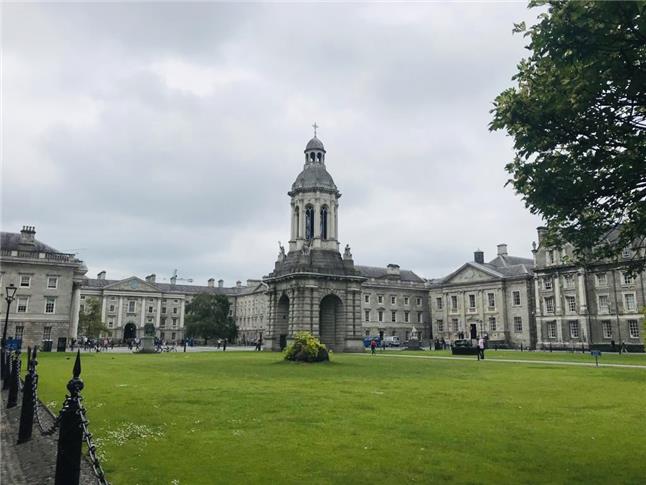
Trinity College, in Dublin
The medieval architecture of the buildings transports the visitor to the 16th century. The stones and the swooping seagulls make up the scene, but students here draw inspiration from the past to write the future.
This is the story of Veronica Sesoko, who a year ago is pursuing a master's degree in transportation engineering at Trinity. She is a great-granddaughter of Japanese, born in São Caetano do Sul, São Paulo Metropolitan Area, graduated in civil engineering at the Mauá Institute of Technology. Veronica is 25 years old and is one of the younger employees of Smart Dublin, at Dublin City Council. Newly hired, she is part of an interdisciplinary team that tests innovation projects feasibility in mobility, social and digital inclusion.

Brazilian engineer Veronica Sesoko during the Velo-City 2019 Photo: Denise Silveira
Ireland is strongly committed to reduce carbon dioxide emissions and preserve the environment like other countries in Europe, heavily affected by recent heat waves sears caused by deforestation and the greenhouse effect. The goal is to make people no longer use fossil fuel powered cars. The public administration wants drivers to switch to the pedal-assist e-bike, where you have to cycling to start the engine.
"Dublin City Council wants to promote walking and cycling. Getting people to change from car to e-bike when distances are considered too long to ride a regular bike," says Veronica.
This week she and her colleagues have just started a new test: Smart Mobility Hub, a program for e-bike and electric car sharing. All did a mandatory training. "In training, the instructor explains how e-bike works, battery life, how to charge the battery, instructions on how to use the bike locks, how to use the bike booking app," says Veronica. In Dublin, she explain, parked bike theft is frequent. She also learned how to inflate tires and how to use the folding e-bike, which can be taken on public transport. And one detail: guideline is to wear the yellow safety vest and helmet, accessories offered by the Dublin City Council.
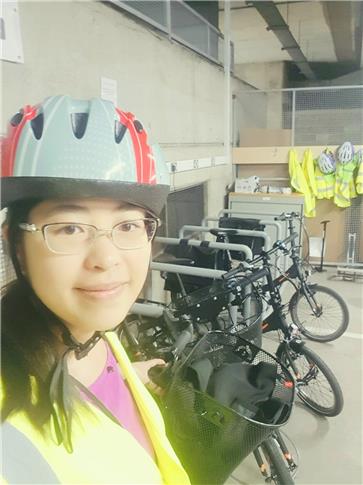
Veronica and the bycicle park at the Smart Mobility Hub, where she works Photo: personal colection
Program is restricted to the workday employees, from 6:30 am to 7:00 pm, during the test period. The goal is to check difficulties, see what actually works and what needs to be improved. In the department where Veronica works there are four e-bikes, four folding e-bikes, and 20 regular bikes. This is phase 2. Phase 1 was a call to companies interested to participate with a business plan. Four companies were selected. Phase 3 will be implementation for everyone, which can be ready in six months. There are four shared electric cars and an electric van also.
But because of insurance, it is mandatory to have national driver's license. The idea of sharing electric cars is an economically affordable outlet, because the cost for individual buying is very high. Not worth it for the consumer even with free recharge. And it doesn't fulfill the traffic goal of getting cars out the streets.
In Dublin, a private food delivery company sponsors the shared common bicycles already in operation, but it is the city that runs it. Those taken and returned at stations. The lock is not on the tire, it is on the side, to make stealing difficult. There is another dockless shared bike service, which can be left anywhere, privately run.
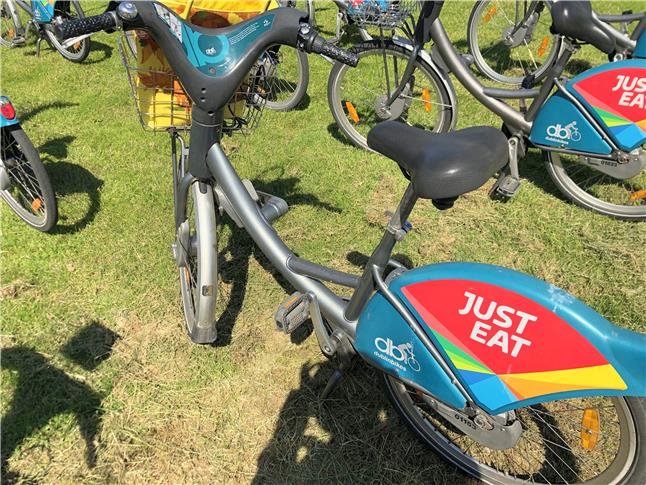
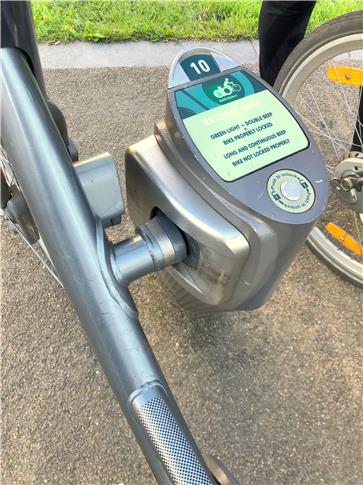
Public bycicles in Dublin and their lock system Photo: Denise Silveira
At Velo-city, Veronica attended the panels related to mobility as a service. In addition to sharing technology solutions, the agenda was associated with the implementation of public policies to encourage cycling and create cycling network. "There are things I've watched, that get influence of realities, cultures and behavior”. She believes that some rules adopted in the Netherlands, for example, do not work in Ireland. And bet on a gradual transition from car to e-bike.
But, some controversies surround the category. Batteries disposal still waits a sustainable industry solution. And most of Ireland's energy comes from thermoelectric, also polluting.
#############
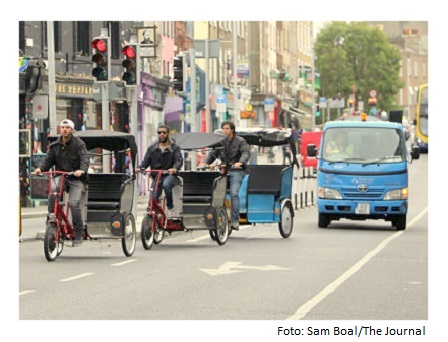
For now scooters are forbidden. Not just in sidewalks, on the streets too. But you can see some of them in the traffic. Users take the risk of having the scooter taken by the police. Quite a financial loss since the toy can cost 600 euros. Subject here is also controversial. Among the vehicles that still depend on regulation, one is unusual. The rickshaw, a kind of bike " tuc tuc". Ministry of Transport estimates about a 1,000 circulating in the capital of Ireland. They are clandestine and can be seen after hours, at the door pubs. They serve young people and tourists who drink too much or get tired to walk back. Taxi here is too expensive. Last year 154 rickshaw drivers have been arrested under a misuse of drugs act. I talked to a Brazilian rickshaw. Charles* tells there are a lot of Brazilians working like him. During the day, they are store and restaurant assistants. And complete the income by the irregular activity. According to the National Transport Authority, 57% of rickshaw passengers reported accidents or near-misses. Number takes into account motorized ones. If you would like to try, Charles* recommends pay attention so you don't have any loss. Set the price before boarding. And confirm that the price is per race and not per person. Otherwise the fare may double when you reach your destination.
*The true name was omitted to preserve the interviewee
|

**Denise Silveira, 50, journalist and documentary filmmaker. Took part at Velo-city as a speaker at the "Media, Friend or Foe" panel. Honorable Mention at Mobifilm 2018, Brazilian Film Festival on Mobility and Traffic Safety, with the documentary "Ciclovia Musical".
Leia a versão em Português
Read and see more (in Portuguese):
Imagens do Velo-City 2019, em Dublin
Irlanda aprova lei que impede país de investir em combustíveis fósseis
Dublin se prepara para tirar os carros do centro
Mart'nália, quem diria, lá no Velo-City de Dublin
Pequenas histórias do Velo-City 2019
Ciclovia Musical, o filme